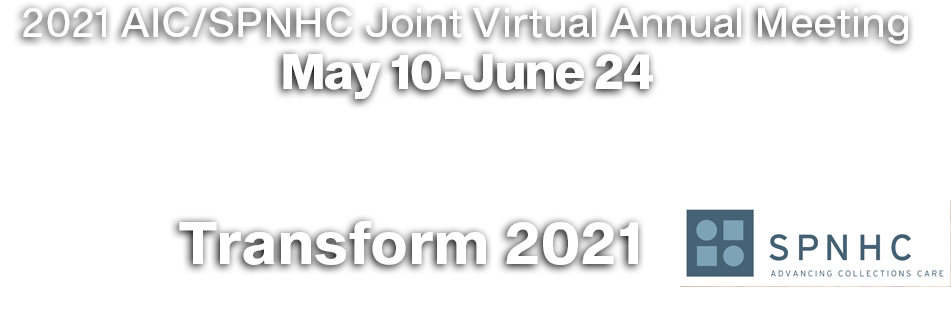
Guidelines for Giving Your Own Land Acknowledgement
AIC Equity & Inclusion Committee
Please join us in giving Land Acknowledgements at the 2021 AIC Virtual Annual Meeting
A land acknowledgment is a statement meant to respectfully recognize the original Indigenous people who inhabited and cared for a specific area before colonization or displacement. They are often given at the start of an event, as was done at the last two AIC Annual Meetings, and will also be done during this year’s 49th Annual Meeting opening remarks. Thoughtful land acknowledgements can be impactful. We cannot remove the racist and colonial practices that influence the conservation field without first acknowledging the original inhabits of the land, past atrocities committed against them, and the ongoing harm that continues today.
The online format of this year’s meeting gives us AIC members the opportunity to join in recognizing the many different tribal lands on which we live. The Equity & Inclusion Committee encourages speakers to give a personal land acknowledgment at the beginning of sessions or before their presentation. This is not mandatory and does not have to be intimidating, a few sentences would suffice. You can also post your land acknowledgement in the chat at the start of the session.
For Example:
“Today I am speaking to you from name of city, which is part of the unceded land of the name of Indigenous people. I would like to acknowledge the name of Indigenous people community and pay my respects to their past, present, and future elders.”
The acknowledgement typically names the Indigenous tribe(s) of the area and, as possible, is presented according to the tribe’s preferences or protocols. At minimum, the speaker gives this statement with the intent to bring public awareness to the communities and histories that are overlooked in that space. However, over time, the acknowledgement should grow as a public commitment to action because of that recognition. Many Indigenous peoples support land acknowledgments, but stress that an acknowledgement is only the beginning. We encourage conservators to think about how they can help Indigenous communities in their area through their actions, donations (monetary or time), allyship, speaking out, etc.
Why is AIC giving Land Acknowledgements?
AIC’s Code of Ethics includes Statement II: “All actions of the conservation professional must be governed by an informed respect for the cultural property, its unique character and significance, and the people or person who created it.” As with any cultural preservation effort, we cannot forget the importance of people in our mission to preserve memory and heritage. Providing this statement is one gesture to demonstrate our recognition of this history and respect for the community where we are living or holding our activities. It is also important to recognize that colonialism and displacement have benefitted many of the cultural institutions in which conservators work. Therefore, EIC is committed to including land acknowledgements at all future annual meetings.
Tips and Resources
- Native Land Digital Map is a good place to start when looking for the Indigenous tribes that may have or currently inhabit your area: https://native-land.ca/
- Enter your Canadian or US zip code into this Land Acknowledgement Bot to receive a message telling you the Native land you are living on. This application is a collaboration between Native Land, Code for Anchorage, and the Anchorage i-team, a Municipality of Anchorage Bloomberg Philanthropy Innovation Team. https://land.codeforanchorage.org (or text your zip code to 907 312 5085)
- Try to use the name that the Indigenous group prefers to call themselves by today. We suggest consulting tribal-run websites. Although reaching out to the tribe directly is usually a good idea, we do not currently suggest requests to tribal members as they are grappling with the COVID-19 pandemic and these requests could be burdensome at this time.
Online Resources:
- Guide to Indigenous Land and Territorial Acknowledgements for Cultural Institutions
- Honor Native Land: A Guide and Call to Acknowledgement
- Native Governance Center: Indigenous Land Acknowledgement
- Are you planning to do a Land Acknowledgement? Guidelines from American Indians in Children’s Literature (AICL)
Discussions Around Land Acknowledgements:
- “Interview with endawnis Spears on Land Acknowledgment, Native Communities and the Role of the Humanities Today” Federation of State Humanities Councils.
- “What are land acknowledgements and why do they matter?” Selena Mills.
- “'I regret it': Hayden King on writing Ryerson University’s territorial acknowledgement” CBC.
Support Indigenous Artists and Communities
- Native Arts and Cultures Foundation | https://www.nativeartsandcultures.org
- Native American Rights Fund | https://www.narf.org
Please don’t worry about making a mistake! People will appreciate your best effort.
More info, resources, and discussions around land acknowledgements can be found on the EIC Land Acknowledgement wiki page.
Do you have any thoughts, resources, or questions about land acknowledgements?
Share them with us on the Equity and Inclusion in Conversation Community Forum or email them to us at: eic@culturalheritage.org. You can also use our anonymous feedback form on the EIC site.
Created May 4, 2020
Updated February 17, 2021
| Access Date | Quiz Result | Score | Actions |
|---|

